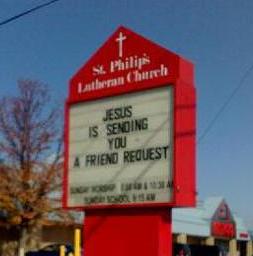Does God read Facebook? Religion and business on social networks may not mix

"Dear God, I ask you for the strength to fight the demons in my daily life, and the courage to show those around me who haven't yet found their way to You, the truth and the light.'"
That's a heck of a status message, no? If you share the same faith and methods of fellowship as this Facebook user, perhaps you might reply to it with a resounding "Hosanna!" But if you don't, would this make you uncomfortable? Or, even more important, how would this impact your relationship if you did business with this person?

"Frankly, my feeling is you should act the same on social media venues as you do in business meetings," said Heather Logrippo, publisher of Distinctive Homes Magazine. "I would not talk about politics, religion or my sex life in a business meeting and thus, will keep my status updates on Facebook clear of anything that could be considered offensive. The point in using social media is to broaden my exposure and chances of connecting with people, not isolating them."
Logrippo said that of her 1,300 Facebook friends, roughly 75 percent of them are potential clients. She said that she does have one potential client that is always posting not-so-subtle religious status messages.
"While I know that there is no harm meant, it does make me uncomfortable," she said.
Logrippo shares the same concerns as many others with whom I have spoken:
- If a user is that outspoken about chosen religion, will there be judgment against those not of the same religion?
- Some users claim to only use social networks as a social tool, but then shouldn't they disconnect from business contacts.
- If you do block a feed, then you always remember that contact as someone you filtered out. Furthermore, if you unfriend someone due to blatant relgious expression, how do you explain it without offending them (even if you were first offended)?
Not everyone shares Logrippo's opinion, however. Robin Hardy, business consultant and motivational expert, said that as a business building expert she encourages her clients to be personal. That includes including faith-based messages on social networks where business contacts might exist.
"I myself put up Bible verses, prayer, what God is doing in my life and it has actually increased my business," Hardy said. "Why should people draw the line with their faith when they are open to use profanity and sexual content and no one seems to mind? People place their party photos where they are drunk as a skunk and no one minds."
Next: Is it ever OK to pray online? -->
There are options for those who don't want to mix religion and business on the mainstream social networks. Krista Dunk founded Koinonia Business Women, an online social networking community specifically for prayer, as well as an organization for faith-based women in business. Dunk said that she founded Koinonia because there are appropriate “lines” when it comes to business communications.
"In order for business people to be effective, they should consider their audience and customers in all that they do, yet without compromising their beliefs and values," she said.
The question is, should believers in any religion be made to feel ostracized from the mainstream networks if they choose to connect with business contacts? Hardy doesn't think so.
"The whole point behind social media marketing is to connect personally, let people know a little about whom you are and what you are about," she said. "Most people, especially non-believers, want to do business with those that are faith-based as they tend to have a label of integrity -- so [the non-believers] know business will be as business should be, most of the time."
Others, like Jason Lander, is fine with those who want to fellowship online having a safe place to do it far from their business relationships. Lander is the founder of Prayer Tide, a social networking site that allows people to express their faith and display their prayer requests in an environment that is separate from their other social networks, which is he plans to launch in 2010.
"One of the primary purposes of Prayer Tide is to provide an environment where people can express their religious beliefs, needs for prayer and prayers for others without the worry that anyone will be put off by such things or feel they are misplaced," Lander said. "It's become difficult for people to truly express their feelings or comments on a lot of social networking sites because these sites are so broad they have blurred the lines between business and personal."
In the end, right or wrong, religious expression online could be a dangerous activity when it comes to business relationships. It appears that the best move for those who believe in online fellowship of any kind could be to find a common interest social network where they can do so in the safety of their community, without impacting their professional lives.
What do you think? Let me know in the TalkBacks.